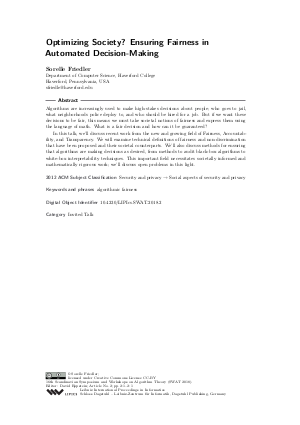Optimizing Society? Ensuring Fairness in Automated Decision-Making (Invited Talk)
Author Sorelle Friedler
-
Part of:
Volume:
16th Scandinavian Symposium and Workshops on Algorithm Theory (SWAT 2018)
Part of: Series: Leibniz International Proceedings in Informatics (LIPIcs)
Part of: Conference: Scandinavian Symposium and Workshops on Algorithm Theory (SWAT) - License:
 Creative Commons Attribution 3.0 Unported license
Creative Commons Attribution 3.0 Unported license
- Publication Date: 2018-06-04
File

PDF
LIPIcs.SWAT.2018.2.pdf
- Filesize: 156 kB
- 1 pages
Document Identifiers
Subject Classification
ACM Subject Classification
- Security and privacy → Social aspects of security and privacy
Keywords
- algorithmic fairness
Metrics
- Access Statistics
-
Total Accesses (updated on a weekly basis)
0Document
0Metadata
Abstract
Algorithms are increasingly used to make high-stakes decisions about people; who goes to jail, what neighborhoods police deploy to, and who should be hired for a job. But if we want these decisions to be fair, this means we must take societal notions of fairness and express them using the language of math. What is a fair decision and how can it be guaranteed? In this talk, we'll discuss recent work from the new and growing field of Fairness, Accountability, and Transparency. We will examine technical definitions of fairness and non-discrimination that have been proposed and their societal counterparts. We'll also discuss methods for ensuring that algorithms are making decisions as desired, from methods to audit black-box algorithms to white-box interpretability techniques. This important field necessitates societally informed and mathematically rigorous work; we'll discuss open problems in this light.
Cite As Get BibTex
Sorelle Friedler. Optimizing Society? Ensuring Fairness in Automated Decision-Making (Invited Talk). In 16th Scandinavian Symposium and Workshops on Algorithm Theory (SWAT 2018). Leibniz International Proceedings in Informatics (LIPIcs), Volume 101, p. 2:1, Schloss Dagstuhl – Leibniz-Zentrum für Informatik (2018)
https://doi.org/10.4230/LIPIcs.SWAT.2018.2
BibTex
@InProceedings{friedler:LIPIcs.SWAT.2018.2,
author = {Friedler, Sorelle},
title = {{Optimizing Society? Ensuring Fairness in Automated Decision-Making}},
booktitle = {16th Scandinavian Symposium and Workshops on Algorithm Theory (SWAT 2018)},
pages = {2:1--2:1},
series = {Leibniz International Proceedings in Informatics (LIPIcs)},
ISBN = {978-3-95977-068-2},
ISSN = {1868-8969},
year = {2018},
volume = {101},
editor = {Eppstein, David},
publisher = {Schloss Dagstuhl -- Leibniz-Zentrum f{\"u}r Informatik},
address = {Dagstuhl, Germany},
URL = {https://drops.dagstuhl.de/entities/document/10.4230/LIPIcs.SWAT.2018.2},
URN = {urn:nbn:de:0030-drops-88282},
doi = {10.4230/LIPIcs.SWAT.2018.2},
annote = {Keywords: algorithmic fairness}
}
